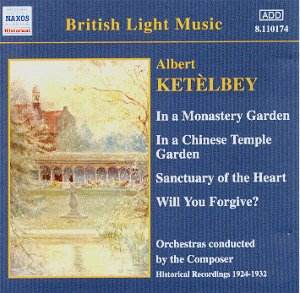Multi-instrumentalist, piano soloist, theatre director,
film and concert suite composer, Ketèlbey was a versatile man.
And his brother Harold were, in the family tradition, violinists of
distinction. The second
volume in Naxos’s British Light Music series devoted to the composer
contained a high quotient of exotica – Egyptiana, cod Eastern paraphernalia,
ballet music, sub-G&S stuff (though not sub by much), eighteenth
century pastiche, operetta, waltzes as well as vocal "effects"
– all wonderful. This – the first volume – doesn’t range quite so quixotically
or delve quite so eccentrically and comically into Ketèlbey’s
legendary arsenal of compositional wit.
Nevertheless once more I succumbed to his particular
brand of melodious charm. Peter Dawson is joined by a gallant chorus
for In a Monastery Garden and seldom has its Mussourgskian antecedents
seemed clearer. And, yes, that is organist Herbert Dawson joining
in the fun (he recorded Elgar’s Organ Sonata six months later in April
1933). If Chal Romano celebrates the Gypsy life (it’s subtitled A
Gypsy Overture) it’s a rather metropolitan and discreet affair and
more briskly melodious than rhythmically galvanizing and brash. Ketèlbey’s
breakthrough piece The Phantom Melody is here, played not on the cello
as originally intended but by Albert Sandler. Intended for the Dutch
cellist-actor Auguste van Biene (star of countless postcards and theatrical
runs and battered old Zonophones) it was recorded by him shortly before
his death (on stage, playing the cello). Sandler’s characteristically
small, sweet portamento-laden tone is perfect for its salon expressivity
(and it was in fact dedicated to the composer’s brother, violinist Harold).
The star of many a dance band, Len Fillis, is on hand for the Hawaiian
excursion – Ketèlbey certainly kept up to date – but this five-movement
suite treads a dangerous and ultimately unsuccessfully schizophrenic
path between the hula and urbane romanticism.
What follows is far more convincing. The Three Fanciful
Sketches of 1928 take in Pastoralism and mildly bucolic peasant merry-making.
The first movement, A passing Storm Cloud on a Summer’s Day, sets the
scene – drum roll, menacing lower brass; vivid, pictorial, rather charming.
The Ploughman’s heavy weather-beaten plod is suitably suggested by the
orchestra in the second sketch and good humour releases instrumental
frivolity in the Elgarianly titled Quips and Cranks and Wanton Wiles,
though Ketèlbey adds the bracketed (Scene de Ballet Russe) just
in case. Much groaning and exotic sawing In a Chinese Temple Garden
– these are sturdy Buddhists – before the only acoustic recording here,
tenor Arthur Jordan, sounding suitably stricken and earnest, in a November
1924 recording of Will You Forgive? In the Moonlight is a delicious
intermezzo and few could bring off rococo pastiche as well as Ketèlbey
– and for good measure he turns up as pianist in The Clock and the Dresden
Figures to prove the point (he is otherwise generally the composer-conductor
on these recordings). We finish, book-ended with another big hit, Sanctuary
of the Heart. The following year this was re-recorded with contralto
Nellie Walker but in 1926 we have an unnamed contralto much in her mould.
An hour’s worth of well-transferred Ketèlbey,
with concise notes by Peter Dempsey; this is probably a more consistently
musically successful selection than Volume 2 – if one excepts the Hawaiian
jaunt. And as such this is heartily recommended to his once more growing
band of admirers.
Jonathan Woolf
